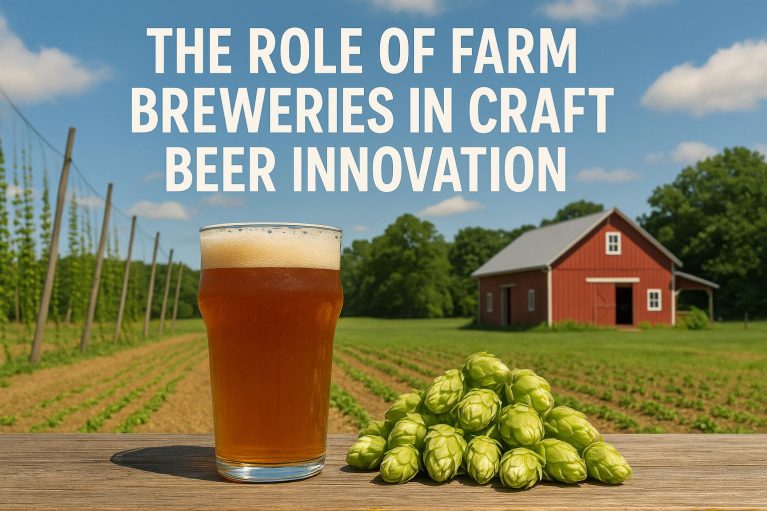The Role of Farm Breweries in Craft Beer Innovation
The craft beer industry has experienced substantial growth over the last few years, with farm breweries emerging as a significant force behind this development. These distinctive breweries have introduced a novel approach by integrating agricultural practices directly into the brewing process, thereby redefining what it means to be a craft brewery.
Understanding Farm Breweries
Farm breweries differentiate themselves from traditional breweries in several ways. Primarily, they emphasize the use of ingredients grown on-site or sourced from nearby farms. This local approach has multiple benefits, including the reduction of the carbon footprint usually associated with transporting raw materials over long distances. Additionally, this model fosters a closer connection between brewing and agriculture, offering a more holistic approach to crafting beer.
Innovation Through Local Ingredients
One of the most remarkable contributions of farm breweries to the craft beer industry is their use of locally sourced ingredients. By tapping into native hops, grains, and various botanicals, these breweries manage to create unique flavors that are deeply rooted in their specific geographical locations. This approach allows them to experiment and innovate in ways that often elude larger commercial breweries due to the latter’s broader and less flexible supply chains.
Brewing with Terroir
At the heart of farm brewing is the concept of terroir. This term describes the environmental conditions, including soil and climate, where hops and grains are cultivated and how these factors impact the flavor profile of beer. Farm breweries adeptly leverage their specific environmental characteristics, crafting beers that are truly region-specific and offering consumers a genuine taste of their local landscape.
The terroir-based approach provides a competitive edge by offering exclusive and distinctive flavors that can’t be replicated elsewhere, further fueling the innovation inherent in the craft beer scene.
Sustainability and Environmental Impact
Sustainability stands as a core tenet of farm breweries. By engaging in the cultivation of their ingredients and implementing eco-friendly farming practices, these breweries minimize their environmental footprint. Many adopt organic methods and incorporate renewable energy sources, along with water conservation techniques, all of which contribute to a more sustainable brewing process.
Eco-Friendly Practices
Eco-friendly farming practices in farm breweries very often extend to the use of composting, crop rotation, and the prevention of chemical run-off into local water systems. Renewable energy sources like solar panels or wind turbines are frequently harnessed to power the brewing operations, and rainwater harvesting is employed to offset the consumption of freshwater resources. These practices underline a commitment to creating a more sustainable, environmentally responsible product and business model.
Community Engagement and Economic Benefits
Farm breweries frequently double as community centers, drawing in locals and visitors alike. Beyond being mere tastings venues, they often offer educational tours and workshops that delve into the intricacies of brewing and farming. This engagement nurtures a strong sense of community and reinforces support for local agriculture.
Economic Advantages
Economically, farm breweries make significant contributions to their local settings. By creating jobs in often rural areas, they help stimulate local economies. Additionally, collaborations with nearby farms for ingredient sourcing support local agriculture and play a part in preserving rural landscapes. The draw of a unique brewery experience also brings tourism, further enhancing economic benefits in the region.
Challenges Faced by Farm Breweries
Despite their contributions to craft beer innovation, farm breweries face several obstacles. Scalability appears as a primary issue because reliance on locally sourced ingredients can restrict production capacity. Moreover, adhering to agricultural regulations and dealing with the inherent unpredictability of farming—such as weather and seasonal changes—pose operational hurdles.
Regulatory and Operational Hurdles
The challenges tied to regulatory compliance can be complex, given the intersection of agriculture and brewing laws. Farm breweries often need to navigate a maze of local, regional, and national regulations concerning both the production and sale of alcohol, as well as agricultural practices. Furthermore, operational challenges can arise from fluctuating crop yields or pest issues, requiring strategic planning and adaptability to maintain consistent production levels.
The Future of Farm Breweries in Craft Beer
With consumers showing an increasing preference for sustainable and locally sourced products, farm breweries are poised to remain innovators in the craft beer landscape. Their unwavering commitment to quality, sustainability, and community engagement ensures that they will continue to play a vital role in shaping the future of the craft beer industry.
The forward-looking path of farm breweries points towards an alignment with technological innovations that could further enhance their farming practices and beer production. Developments in precision agriculture, enhanced resource management tools, and renewable energy technologies could complement their existing frameworks and bolster their mission to innovate sustainably in craft beer production.
For more detailed insights into how farm breweries are transforming the craft beer industry, you might consider exploring additional resources to deepen your understanding of their pivotal role.

